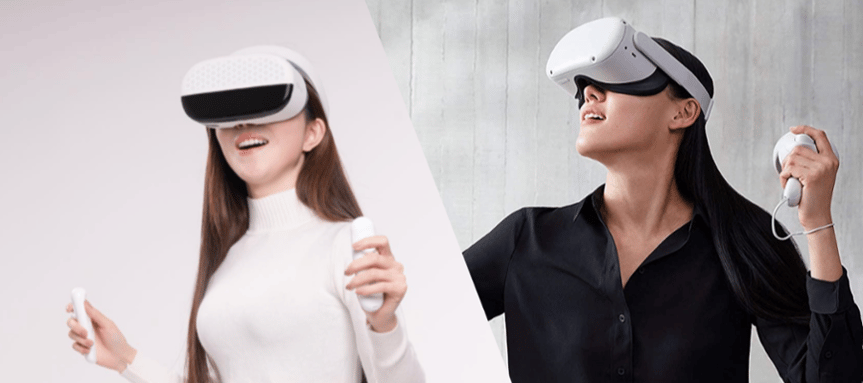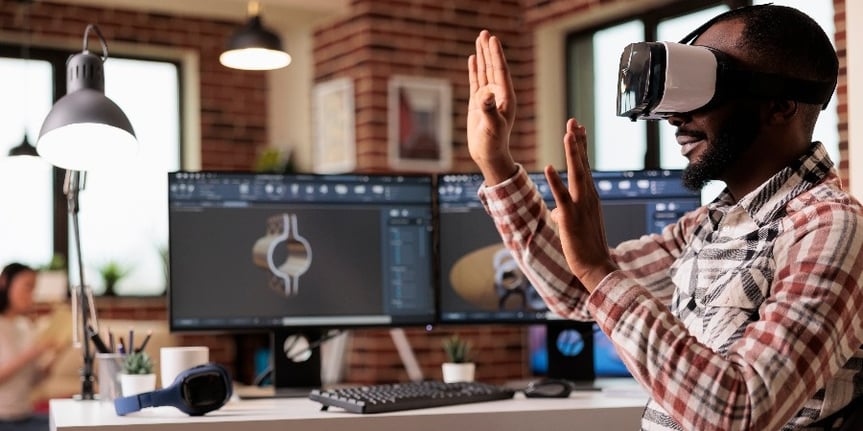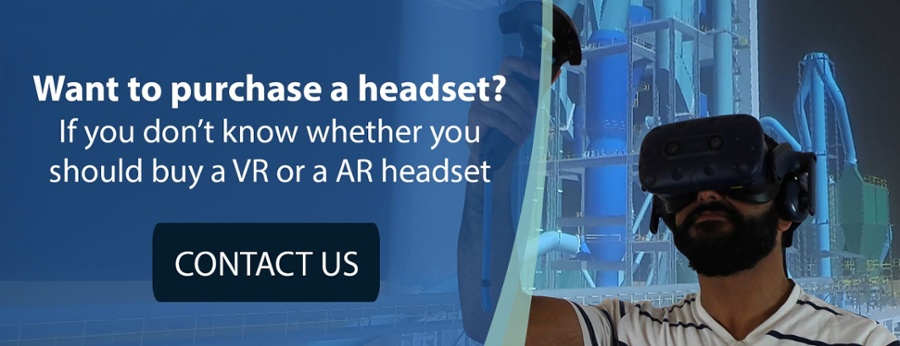
Just one month ago, we learned that the Chinese internet giant ByteDance, owner of the popular Tik Tok app, would acquire Pico, the third-largest maker of VR headsets globally. This piece of news has created quite a buzz within the XR community as it sets the stage for head-on competition between Facebook / Oculus and ByteDance / Pico, not to mention Microsoft / HoloLens and the much-rumored future launch of an Apple headset. What is the impact for professional users of the foray of Big Tech into XR? Should they rejoice or worry? Are specialized makes doomed to disappear?
As TechViz VR software is compatible with all types of HMDs, our team is accustomed to using all models, hence well-equipped to address these questions. We have divided our answers into 3 parts:
- When to buy a headset from Big Tech?
- What are the caveats involved?
- What are the reasons to buy a “boutique” headset, and why are they here to stay?
The cases in which Big Tech headsets are your friends
Let’s not join the chorus of naysayers. Overall, having big companies with almost unlimited resources investing in extended realities is pretty good news! It means they believe, just as we do at TechViz, that these technologies will have a huge impact in the coming years. In practical terms, it will create a race to launch cheaper and better equipment, with increased resolution, wider field of view, improved ergonomics, etc. Today, you can already buy a pretty decent headset for less than €600 (read our 2021 comparison of the best headsets for more details) and the trend is bound to continue, in part thanks to the involvement of such driving forces.
.jpeg?width=867&height=424&name=moteur%20en%20vr%20(1).jpeg)
The aim of these software specialists, venturing into hardware, is to embed the device tightly into their wider ecosystem. This would mean an increased simplicity of use, accessible for large audiences. So, if you’re not a VR specialist and just want a plug-and-play device to help you with rather simple tasks such as project reviews or distant virtual collaboration, a headset from Big Tech companies might be a smart choice.
Moreover, enterprise versions of the headsets are available, with specific general conditions to soothe the anxieties of companies that are not fond of the fox guarding the hen house. Indeed, inputting your 3D data - which is one of the most valuable assets of a company, in devices controlled by organizations that are not known for the respect of confidentiality and privacy would otherwise be stressful. In the case of Oculus, to name it, the program is called “Oculus for Business” and does not require to be registered with a Facebook account, unlike the consumer version. That is to say that companies using the professional version of the Oculus can rest assured: their confidentiality and privacy will be well guarded.
Big Tech headsets challenges

There are indeed some caveats to what we have just said. First, enterprise versions of the headsets are usually 30 to 50% more expensive than the consumer version. They also often involve a yearly subscription for their software platform. These are usually very helpful to manage fleets of HMDs with features to send content, check status, etc… Yet, they are clearly more designed for operators of location-based entertainment, with dozens of HMDs, than R&D departments with a handful of devices.
Additionally, we have to recognize that the professional segment remains merely an afterthought for such mammoth companies. The situation is probably very fluid, but, as we speak, it is almost impossible to get an enterprise version of the Meta Quest 2 (previously Oculus Quest 2).
Last but not least, the tight embedment within the wider ecosystem makes such hardware prone to suffer from the vicissitudes of the general environment. The big October 4th, 2021 outage of Facebook has also made Oculus devices unavailable for six hours. The good news is that some engineers have been able to reconnect with their teenage, Instagram-addict, daughters during this time, as both were without their favorite toy, but this is beside the point.
Specialized makes still have a future

Even in less dramatic circumstances, specific constraints of enterprises will probably never be a top priority for Big Tech companies. It is quite understandable as such constraints are quite far away from their core business, but it paves the way to the persistence of other products to cater the “niche” segment of VR and AR for business.
If you have advanced use cases of extended reality in mind, such purpose-designed products are probably better for you. Indeed, the one-size-fits-all approach quickly reaches its limits. For instance, let’s say you are trying to assess the maintenance scenario of a future product, involving body-tracking or a similar technology, you will surely require an SDK that is quite open. As a consequence, hardware companies able to offer a reasonably open architecture will surely continue to strive.
In addition, one cannot allow AR and VR to become the weakest link regarding corporate data security. Whatever way you look at it, a product specifically designed for B2B applications will always be more trustworthy in that respect than its counterpart from a corporation whose core revenue generation derives from the monetization of the data of its users. As far as the software part is concerned, solutions without any upload such as TechViz are indeed the most secure. Coupled with a professional headset, they are sure to keep your data out of harm’s way.
You'd like to know which XR headset would be more suited to your business? You can check-our our complete guide of VR for business. And if you have more specific questions about which head-mounted device to use for your use case, we are glad to hear from you.
Check-out our other articles about the evolution of virtual and augmented reality, and how it could benefit your business:






 Back to Blog
Back to Blog




